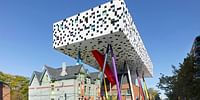- Bioresource Engineering is an interdisciplinary program that integrates engineering, design, and the biological sciences.
- Bioresource engineers seek solutions to problems that involve plants, animals, and the environment.
- Bioresource Engineering includes the design, construction, operation, maintenance, remediation, and upgrading of systems that contain biological components.
- This also includes the design of many of the technological constructions that are part of such systems.
- Master of Science (M.Sc.) Bioresource Engineering (Thesis) (45 credits):
- This option for the M.Sc. degree is oriented toward individuals who intend to develop a career in bioresource engineering research.
- The research areas include: plant and animal environments; ecological engineering (ecosystem modelling, design, management and remediation); water resources management (hydrology, irrigation, drainage, water quality); agricultural machinery, mechatronics and robotics; food engineering and bio-processing; post-harvest technology; waste management and protection of the environment; bio-energy; and artificial intelligence.
- Master of Science (M.Sc.) Bioresource Engineering (Thesis): Environment (45 credits):
- The Environmental option is coordinated through the Bieler School of Environment (BSE).
- This option is intended for students who want to take an interdisciplinary approach in their graduate research on environmental issues.
- Students will learn how to transfer knowledge into action and develop an appreciation for the roles of science, politics, economics, and ethics with regard to the environment.
- Master of Science (M.Sc.) Bioresource Engineering (Non-Thesis): Integrated Water Resources Management (45 credits)
- Integrated Water Resource Management is a one-year program providing an essential approach for sustainable management of our natural watershed resources.
- The 13-credit internship is a central feature of this master’s program.
- The degree gives students the unique opportunity to study the biophysical, environmental, legal, institutional, and socio-economic aspects of water use and management, in an integrated context.
- The degree is directed at practising professionals who wish to upgrade and/or focus their skill set to address water management issues.
- As a graduate from this program, you will be well suited to opportunities in diverse fields of employment, such as water resources consulting, international development project management, research with governments or universities, public policy and governance development, and climate change impact assessment.
- Financial aid is available but limited and highly competitive
₹17.3 L/Yr
CA$28,209 /Yr
Important Dates
| Event | End Date |
| Application Deadline For Fall 2023 Intake | Mar 15, 2023 |
Fees & Funding
Tution & Application Fees
| Year | Year 1 |
| Tuition Fees | ₹1658414 |
| Health Insurance | ₹73619 |
| Total Fees | ₹1732033 |
Eligibility & Entry Requirement
Academic Eligibility:
- Students hold a Bachelor's degree or equivalent from a recognized University.
- Students should have a cumulative grade point average (CGPA) of 3.0/4.0 (second class–upper division) or a grade point average (GPA) of 3.2/4.0 during the last two years of full-time university study is required at the bachelor's level.
Indian Student Eligibility:
- Indian students need to maintain an overall average of 60% in each year.
- The minimum GPA required is 3.0/4.0 or students must have B grades in their degree.
- Along with the minimum eligibility requirements, international students hailing from non-English speaking countries need to prove English proficiency through IELTS/TOEFL/any equivalent test.
The above requirements are the minimum requirements and do not guarantee admission. The admissions committee will consider all evidence in the file and decide. To know more about the requirem….Read More
Scores Required
Course Guides
Masters (MS) in Canada: Fees 2023, Top Colleges, Admissions, Placements & Salaries
Masters in Engineering (M.Eng) in Canada 2023: Top Colleges, Fees, Admissions, Financial Aid, Jobs
Career and Placement after Course
- Consulting Engineer.
- Design Engineer.
- Research Engineer.
- Managing Engineer.
- Extension Engineer (government)
- Policy Analyst.
Scholarship Grants & Financial Aids
| Name | Amount | International Students Eligible | Application Deadline |
| Sandhya and Swati Sharma MBA Leadership Award | ₹480332.2 | Yes | Mar 15, 2023 |
| Deutschland Stipendium Program | ₹267888.2 | Yes | N/A |
| Prodigy Finance-GyanDhan Scholarship | ₹153500 | No | Aug 31, 2023 |
| Australian Government Research Training Program | Variable | Yes | Sep 15, 2023 |
Ask your question
Similar Colleges You Might Be Interested In
- Similar Colleges
No Ratings Found!!
Follow
No Ratings Found!!
Follow
No Ratings Found!!
Follow
No Ratings Found!!
Follow
No Ratings Found!!
Follow
No Ratings Found!!
Follow
No Ratings Found!!
Follow
No Ratings Found!!
Follow






.jpeg?tr=h-100,w-200,c-force)







